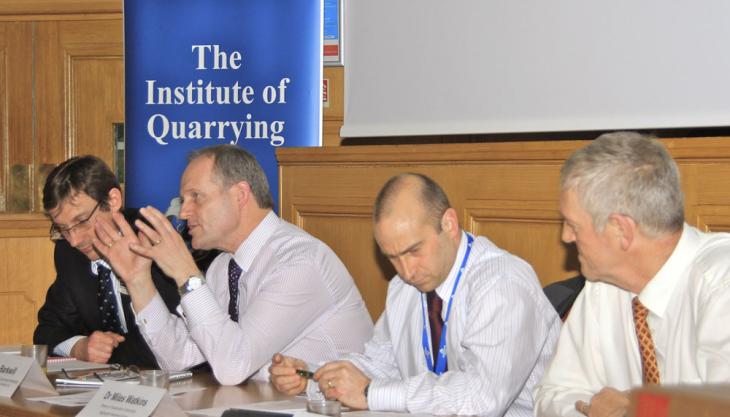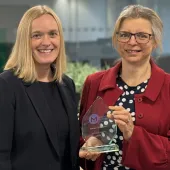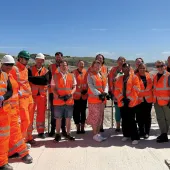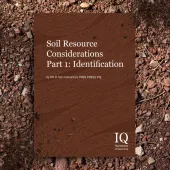Quarry Question Time 2012

The Derbyshire branch of the Institute of Quarrying held its fourth annual Quarry Question Time event on Thursday 1 March in the Court Room at the University of Derby’s Kedleston Road site. This year’s theme centred on the impact of the continuing recession on the future of the quarrying industry.
Panel members debating the topic were: Roy Bush, HM Inspector of Health & Safety with the HSE; Peter Barkwill, Chairman of the Institute of Quarrying and managing director of John Wainwright and Co. Ltd; Andrew Hartley, managing director of strategic developments at the University of Derby; and panel chairman Dr Miles Watkins, director of sustainable construction with Aggregate Industries Europe.
Question 1 from the floor was: ‘With great news for the East Midlands regarding investment in manufacturing by Nestle, Toyota, Caterpillar and Rolls Royce, does the panel believe that this should be supported with improvements to the road infrastructure and the removal of bottlenecks around the area?’ Panel members responded that transport and infrastructure were vitally important for investment. It was thought that not enough money was being spent on road improvements. High-speed rail will not help investment in manufacturing, but a healthy debate is required about transport for the future, and it was acknowledged that there should not be a free-for-all for roads. Investment in infrastructure has to be sustainable and look at all modes of transport, including rail freight. Road investment is required where it is needed and it was felt that the Government is not grasping the nettle regarding transport. It was also felt that it is logical to move bulk goods by rail as much as possible, and that academia is well positioned to provide research and evidence to support arguments around the future transport needs of the country.
Question 2 from the floor was: ‘Is it time that economic considerations were given greater weight in mineral planning applications, to balance increasingly demanding environmental impact assessments?’ Panel members felt that industry does lobby hard for the economic side regarding mineral planning. Environmental impact assessments are required and they need to be transparent. The industry does need to leave improved areas after quarrying. The main frustration with the planning process is the length of time it takes to get a planning application approved. It was acknowledged that the industry had not done well in the past in respect of environmental standards; however, the view was that the industry had ‘grown up’ over the last 15 years and now does things very well.
Another view expressed was that public relations is a big issue. The quarrying industry is not perceived to be one people wish to move into, with public perception still being stuck in the Fred Flintstone era. The industry needs to change this perception and need to do it properly. It was felt by panel members that, overall, the industry is coming on in leaps and bounds, and that, collectively, the bar should continue to be raised. However, companies need to tell people what they are doing, eg by having good-quality, clean transport delivering products and ‘advertising’ what the mineral companies are all about.
A further comment from the panel was that the University of Derby is trying to ensure that students are ‘industry ready’, in terms of environmental challenges and public perception, through vocational institution enterprise modules and sustainable engineering modules. The importance of quarries engaging with their local communities was also stressed.
Question 3 from the floor was: ‘Given the current cuts to funding faced by higher education institutions, how do English universities continue to engage with industrial partners to ensure that the quarry industry has a fully educated and competent workforce?’ The panel responded that the reforms that have been put in place all revolve around full-time undergraduate courses. Changes in funding mean that the money now follows the student, which results in an increase in competition. With loans for a university course now running at £27,000, employability becomes the key factors for students. They need to ensure that they are equipped to obtain a good job so that the loan can be repaid, and universities need to focus on ensuring students have the right skills to make them employable. A university will have to sell itself to industry in order for industry to invest in the university.
The panel felt that it was right and proper for industry to invest in the future, and indeed to get involved in telling the education bodies what it is that industry needs and then invest in this. The panel also acknowledged that some companies are investing in universities by funding employees through courses. It was argued that the Government’s policy of putting as many people as possible through university was not necessarily the right thing. The increase in fees may have a positive result in getting students to focus more on their chosen career path. On the other hand, a degree course can be a life-changing experience for many people. More opportunities are opened up for more people, which can only be a good thing.
The panel also felt that the quarrying industry is more organized and better at putting across to the education establishment just what it is that the industry wants from a graduate. It was also felt that people did not necessarily need to go to university for a life-changing experience. Other ways and routes are available for high achievers. Industry needs good managers who can manage people well. They also have to be left alone to get on with managing. It was also felt that systems need to be in place to attract the people that the minerals industry wants. If people are already turned-off about the minerals industry before going to university, they will not want to move into the industry after university.
The panel felt that the industry jointly needs to promote the minerals sector to younger people to generate interest at an earlier age. It was acknowledged that there is a huge amount to do and that the MPA and major companies need to play their part. However, seeds are being sown. The Earth Science Centre in the Mendips, with an investment of £250,000 million by John Wainwright & Company Ltd, is an example. Some 5,200 school children have been taken through the study centre and future visits are fully booked. As a result, the centre is looking to expand.
The panel felt that the Institute of Quarrying is doing an excellent job at providing education resources for people in industry, allowing them to upskill in various areas. Since 2008, the industry has been shrinking but membership of the Institute has been growing.
A science teacher in the audience commented that ‘education is a collective responsibility for schools, universities and industry. The Careers Service has now been disbanded. Industry needs to get into class rooms to show what it is all about, put science learning into context and help children aspire to do something’.
Question 4 from the floor was: ‘With redundancy, short time and high unemployment, how can we improve the level of morale within the industry and make it an attractive, rewarding and exiting career proposition?’ Panel members felt that there were issues with certain elements of employment legislation that did not help matters. Some people have had to reapply for their jobs two or three times. There is so much restructuring taking place within the major companies, which is making things difficult. It was felt that the minerals industry is probably one of the most exciting to work in due to the variety of roles and responsibilities. However, other industries are also undertaking restructuring as a result of the economic climate and the need to remain competitive within the market. The panel did not think that low morale was having a negative impact on health and safety performance. It was posed that the economic climate will improve again, but what happens next time? Plans need to be prepared and put into place for when the next recession comes. A question raised from the audience was: ‘Will people who have left the minerals industry due to the recession come back into it again once things improve?’ The panel recognized that it is vitally important to retain skills, but this was a difficult balancing act.
Question 5 from the floor was: ‘There is a perception that the days of partnership between the quarry industry and its regulators are over. Would it be in the interests of the industry if partnership working with regulatory bodies could be re-established?’ The panel response was that this perceptions seemed to be due to a communication issue. Although the Quarries National Joint Advisory Committee (QNJAC) exists, not everyone knows about it or what it does. A communication working group has been set up by QNJAC to improve the communication process and reach more people. It was felt that the biggest failure was not communicating enough. The panel also thought that the relationship with the regulators remained excellent and that the industry sees the HSE as a support in helping to achieve safe working environments. It was commented on that HSE resources are being wound back significantly (by 30%). Visits are likely to be better targeted in the future. The HSE will be working with majors to carry out specific audits, which companies will be aware of, such as blasting operations. A report on the findings will then be presented. If anything of concern is noted outside of the audit scope, this will be discussed.









